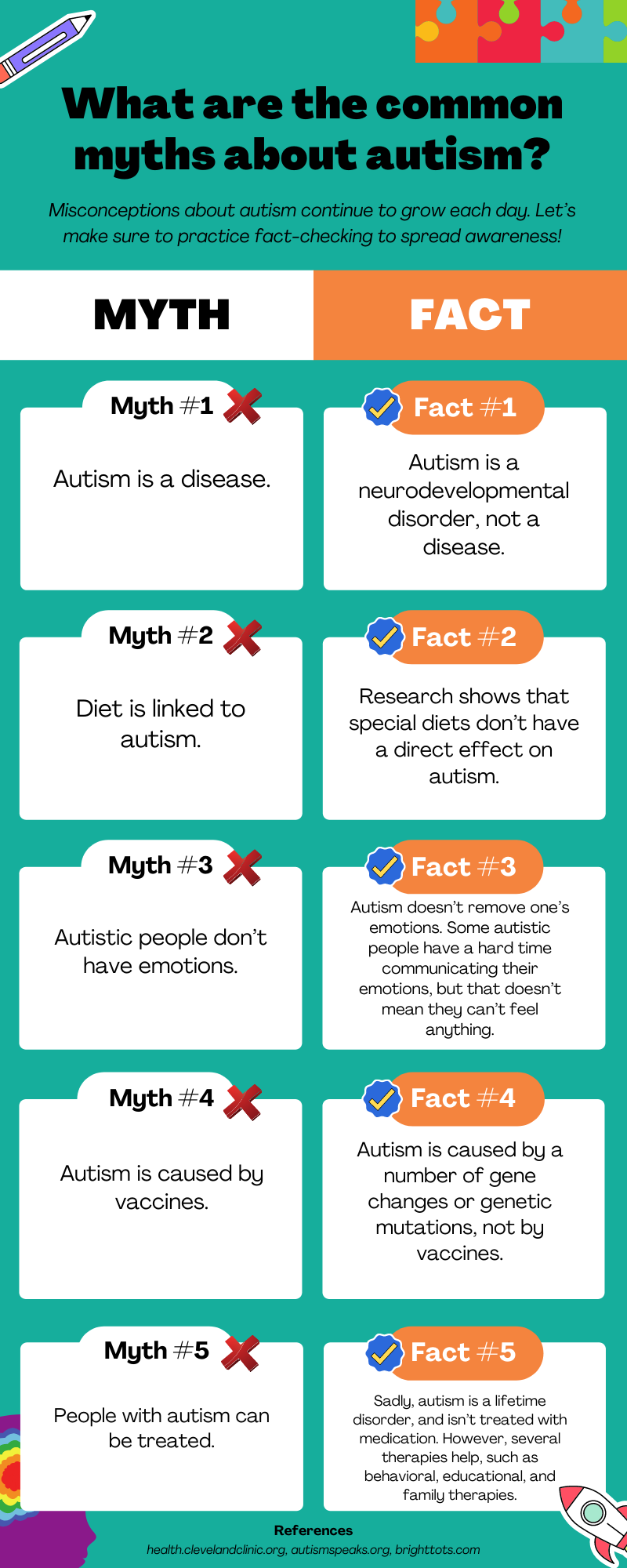5 Myths About Autism: Busted
“In this day and age, the old Russian proverb “trust, but verify” holds true.”
With the rise of social media and its share buttons, misconceptions about anything can be easily seen as truth, including autism. While the internet can be helpful in spreading awareness about autism spectrum disorders (ASD), it’s important to practice fact-checking to avoid promoting myths. In this article, we listed 5 myths about autism--and the truth behind it.
Myth #1: Autism is a disease.
Truth: Autism is a neurodevelopmental disorder, not a disease. Autism isn’t linked to one type--it has other types caused by different genetic problems. While genetics, changes in neurotransmitter levels, and abnormality in the brain structure play a role in causing autism, there are environmental factors that can contribute to its severity. These environmental factors before pregnancy contribute to autism’s risk factors:
Immune system disorder during pregnancy
Obesity and diabetes during pregnancy
Prematurity and low birth weight
Exposure to harmful chemicals during pregnancy
Oxygen deprivation during birth/difficulty in giving birth that can lead to oxygen deprivation
It’s important to know that these environmental factors don’t cause autism, rather, together with genetic problems, they tend to increase the child’s risk factor for developing autism.
Myth#2: Diet is linked to autism.
Truth: Since there’s no medicine that can cure autism, parents turn to alternative treatments for it. Hence, special diets were linked to their cure--unfortunately, research shows that special diets don’t have a direct effect on autism, let alone cure them. However, autistic individuals with food allergies can take special diets to manage their allergies.
Myth #3: Autistic people don’t have emotions.
Truth: A big portion of people diagnosed with autism also suffer from anxiety--which sometimes can cause them to avoid social gatherings and situations. Aside from anxiety, autism affects the social interaction of an individual, too. Individuals with ASD often come out as unfriendly, but the truth is they struggle with social skills--which can affect their communication. Often, they find it difficult to let other people know how they feel, or how to express what they like. This allowed people to think that individuals with ASD are emotionally detached. Autism doesn’t remove one’s emotions. Some autistic people have a hard time communicating their emotions, but that doesn’t mean they can’t feel anything.
Myth #4: Autism is caused by vaccines.
Truth: While Wakefield claimed this in 1998, it was never proved. Andrew Wakefield, a British anti-vaccine activist, and a former physician claimed that autism is linked with measles, mumps, and rubella vaccine. The publication of this paper caused a lot of parents to be afraid of vaccinating their children, which led to a global outbreak of measles and rubella. Wakefield’s claims were not supported by publications and were later retracted in 2010.
Although the myth of autism being caused by vaccines is still apparent today, it’s proven that autism is caused by a number of gene changes or genetic mutations--not vaccines.
Myth: People with autism can be treated.
Truth: Sadly, autism is a lifetime disorder, and isn’t treated with medication. However, several therapies help, such as behavioral, educational, and family therapies. These therapies can help people with autism develop skills, including communicating, recognizing emotions, and social engagement. For example, occupational therapy can help people with autism in their daily living. Depending on the approach of the therapy, individuals can improve their attention span, focus, engagement skills, and motor skills for objects.
Unfortunately, the myths about autism continue to increase until today--and some people aren’t aware of it. It’s an important practice to share reliable information with the right sources to avoid myths and misconceptions--this way, people can know the right approach and idea towards people with autism.


